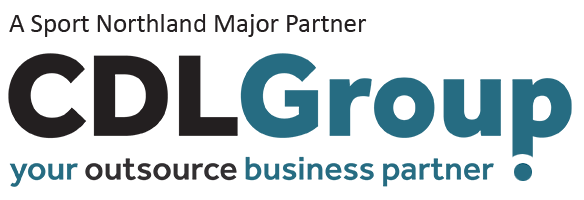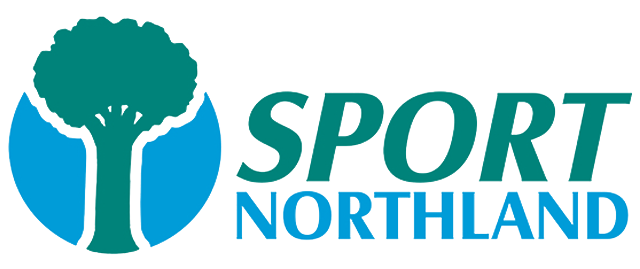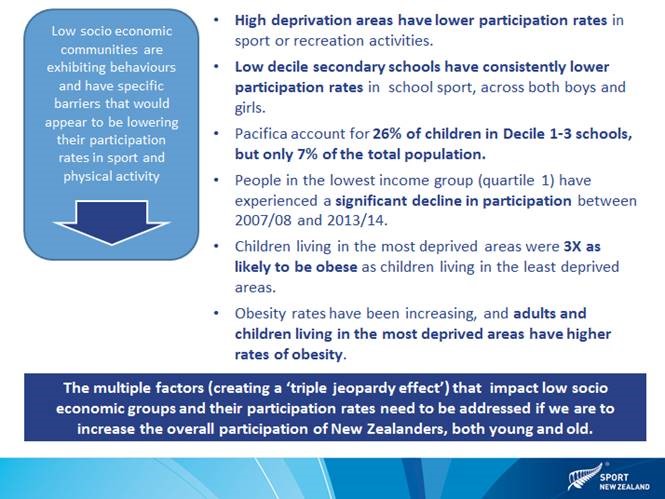

WORKING WITH COMMUNITIES
Our plan
OUR SYSTEM APPROACH
One of Sport Northland's key strategic objectives is to support “community-led interventions in identified communities that improve their outcomes". What this means to us, is that we work in targeted systems and support them to be connected and capable of delivering and sustaining participation opportunities that matter to their participants.
We have defined that a (great) Northland play, active recreation and sport system is one that is connected and capable of delivering and sustaining participation opportunities that matter to their participants; an environment where stakeholders arrive at a shared understanding of how to work collaboratively and in doing so, concentrate resources and good practice on improving the quality of sport and recreation delivery across the region.
The following national research and thinking arising from it are compelling reasons why Sport NZ is asking Regional Sports Trusts (like Sport Northland) throughout the country to focus on highly deprived, low socio-economic communities first, in order to have the biggest impact on participation.

In order to arrive at which communities to work in first, Sport Northland proceeded to map out a number of communities throughout Northland which were high (comparatively) in the following:
- Deprivation levels
- Overall population (including projections)
- Maori (% of population, including projections)
- Young people (% of population, including projections)
This was determined by research that Sport NZ undertook (as part of developing their Community Sport Strategy), which suggested that there are larger decreases in sport and recreation participation of younger adults, Maori, Pacifica and lower income households.
As well as the four previously mentioned factors, other factors taken into account when determining if these communities were the right ones to focus on initially included:
- Environmental/infrastructure summary of each community (what exists as part of that system eg. does the community have a secondary school)
- Readiness of this community to run with this new ‘system’ approach
- Existing level of Sport Northland involvement in the particular community
- Lifestyle stages in that community as a % of the population
After an exhaustive exercise, the following local communities (sport systems) were agreed to initially work with:
- Far Far North: Kaitaia (main focus) and Ahipara
- Mid North: Kaikohe (main focus) and Kawakawa/Moerewa
- Kaipara: Dargaville (main focus) and Paparoa/Maungaturoto
- Whangarei: Otangarei (main focus), Onerahi and Hikurangi
How we work in these communities, is through a community-led approach.
COMMUNITY LED DEVELOPMENT
The essence of Community-Led Development (CLD) is working together in a place to create and achieve locally-owned visions and goals. Rather than being a model or service, CLD is an approach that spans design, planning and implementation. There are five core principles of CLD practice:
- Understand your community for shared local visions that drive action and change
- Using existing strengths and assets
- Many people, groups and sectors working together
- Building diverse and collaborative local leadership
- Working adaptively, learning informs planning and action
Community led projects we are involved in are:
- Ahipara Domain collaboration
- Korora St Park redevelopment (Ahipara)
- Te Hiku Sports Hub (Kaitaia)
- Lindvart Park, Kaikohe
- Kaikohe basketball court project
- Opononi School Sport & Recreation Hub development
- Te Kopuru Domain project
- Ruawai Cycle & Walkway project
- Kauri Coast Community Pool, Dargaville
- Paparoa Sport and Recreation Assn
- Selwyn Park Fitness Trail
- Otangarei basketball court redevelopment
If you, your organisation or group are interested in working in a Community Led way on a project in your community, contact one of our Community Connectors:
Far North – Lesley Wallace, [email protected]
Mid North – Hayley Paul, [email protected]
Kaipara – Helena Thompson, [email protected]
SPORT NORTHLAND
CDL Group Northland Sports House
97 Western Hills Drive, Kensington,
Whangārei 0112
[email protected]
CDL Group Northland Sports House - 09 437 9600
McKay Stadium / Kensington Fitness - 09 437 4404




 Members
Members Admin Login
Admin Login